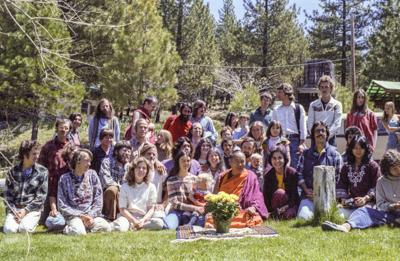What is meditation? Meditation is simple. It means maintaining memory of the object you’re focused on; here, the clean clear nature of mind. It means keeping your focus on one object without spinning or reacting.
For example, when you’re filming something, first you check that your object is in focus and once it is, you let go. That’s a good example. First you set your mind on the object and once it’s clear, let go. The cameraperson’s goal is to maintain focus. That’s meditation.
At the same time, you comprehend, or are aware of, what reflections enter the mirror of your clean clear consciousness. Remain aware, but don’t react to what appears; don’t engage it in conversation, “Hello, how are you again?” Just be aware, don’t converse, because when you start a that-this conversation, superstition arises.
Another example is when you and a friend are walking down a track. Part of you is watching the ground to make sure you don’t trip over anything; at the same time you’re chatting with your friend, “Blah, blah, blah.” That’s why the human mind is powerful; that’s why human beings are buddha. Yes; as a matter of fact, buddha is within you. We can do two things at the same time and comprehend both simultaneously.
Also, the way you should develop comprehension is without forgetting your focus. You’re walking continuously and at the same time talking. Similarly, in meditation, you keep your mind focused on the object of concentration and at the same time, without shifting from there, your comprehension, or awareness, functions as a spy, watching what’s going on without reacting. The perfect spy watches without reacting.
Another thing to remember is to let go and not be greedy: “I want more; I want more.” That’s no good. Stay away from that. When you want more you start exerting unnecessary effort. That’s a hindrance to good meditation. Be careful.
So, being a meditator isn’t an easy job. How much effort should you exert and when? Take the middle way. Too much effort makes you tense. When you get tense you get tired. Then the quality of your meditation deteriorates. That’s its nature. So be reasonable. It’s like human relationships. When there’s tension between a couple they start grabbing at each other and when that happens you know they’re going to crash. You can see. Meditation is similar; so you have to be very skillful in the way you apply effort.
The other thing you need skill in is applying the antidotes to sluggishness. There are two forms of sluggishness, gross and subtle. It would take too much time to go into detail here but I just want to warn you to look out for it. When you’re contemplating the clean clear nature of your own thought and a slight impression of darkness enters your mind, that’s a sign that sluggishness is arising.
It’s a bit like when you’re outside in the sun and a light cloud quietly moves over the sun making your surroundings a little less bright. So watch the brightness of your meditation and if it starts to dull, put in a little effort to clear it up. But don’t then keep trying to make it clearer, clearer, clearer with more and more effort. If you do you’ll just get totally distracted again. So be careful.
When you’re contemplating the clarity of your thought you can get an experience that your body no longer exists, or perhaps you can see your subtle body in such great detail that feel you could count the number of atoms in your body. Such things happen. Another point you might reach is where you feel you could count all the atoms in the universe; or perhaps there are none—everything has disappeared. No matter what you experience, don’t react; don’t make conversation. Just be aware but do not shift from the main point of your meditation; comprehend what’s happening but keep going.
When you bring your meditation to an end you might feel as if you’re a new being that has come from space, that your body is also new. I’m not talking about what’s actually happened—just the way you feel, what you might experience.
This kind of meditation can also help you overcome negative feelings about your body; that it’s sort of old and damaged and kind of heavy. If you think of your body that way then that’s how it will appear. Instead, you should recognize it for the valuable, precious mechanism that it is.
We’ve all had that experience. Sometimes, for no apparent reason—you’re eating well, sleeping well—you always feel tired, heavy. This means that somewhere within you’ve decided you’re heavy. Your mind has decided you’re heavy, so you feel heavy. You can overcome that by applying the antidote—decide you’re light, run a bit and perhaps that heavy feeling will disappear. It can happen; sometimes the mind is very strange.
When you do this meditation well and have a really clean clear experience, especially if you develop deep focus on the clarity of our consciousness, you will feel much bliss and joy because your superstition, ego conflict and dissatisfaction have dropped out. When they’re absent, bliss automatically arises.
But to get there you have to start small and deep. Small and deep is much better than pushing for a sudden explosion of energy. That coupled with a lack of wisdom leads to further uncontrolled samsaric trips. So, start deep and small.
Bliss arises through meditation and concentration; bliss is the result of proper meditation. Blissful sensations start in your mind and gradually extend to your body so that you experience physical bliss. However, again, when that happens, don’t engage your bliss in conversation: “Oh, I’m so happy! How are you?” That will just cause superstitions to arise once more. Instead, be aware, but maintain perfect mindfulness of your object of concentration.





























